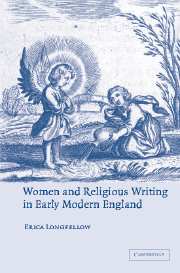Book contents
- Frontmatter
- Contents
- Acknowledgements
- Abbreviations
- Note on transcription and citation
- Introduction
- 1 ‘Blockish Adams’ on mystical marriage
- 2 Ecce homo: the spectacle of Christ's passion in Salve deus rex judæorum
- 3 Serpents and doves: Lady Anne Southwell and the new Adam
- 4 Public worship and private thanks in Eliza's babes
- 5 Anna Trapnel ‘sings of her Lover’
- 6 The transfiguration of Colonel Hutchinson in Lucy Hutchinson's elegies
- Conclusion
- Bibliography
- Index
- Index to scripture passages
2 - Ecce homo: the spectacle of Christ's passion in Salve deus rex judæorum
Published online by Cambridge University Press: 22 September 2009
- Frontmatter
- Contents
- Acknowledgements
- Abbreviations
- Note on transcription and citation
- Introduction
- 1 ‘Blockish Adams’ on mystical marriage
- 2 Ecce homo: the spectacle of Christ's passion in Salve deus rex judæorum
- 3 Serpents and doves: Lady Anne Southwell and the new Adam
- 4 Public worship and private thanks in Eliza's babes
- 5 Anna Trapnel ‘sings of her Lover’
- 6 The transfiguration of Colonel Hutchinson in Lucy Hutchinson's elegies
- Conclusion
- Bibliography
- Index
- Index to scripture passages
Summary
Aemilia Lanyer's passion poem Salve deus rex judæorum (1611) presents a familiar dilemma for historians of women's literature. Although Lanyer was not the first woman writer to print a poem, there were not many to precede her, and although other women had added dedications to their poems, none had so clearly inscribed the search for patronage into their work. Perhaps most significantly, few women writing before her were as concerned with vindicating women's virtue and questioning contemporary constructions of gender.
Given these facts, it is easy to see why many critics have hailed Aemilia Lanyer as a pioneer: ‘the first woman writing in English who clearly sought professional standing as a poet’; a radical thinker with ‘a vision that yearns toward a feminist space’. Yet while it is important to acknowledge that Lanyer had few female poetic contemporaries, and that her attention to gender was not common, celebrating her achievement within those circumstances is much more problematic. The difficulty with such readings is that they tend to isolate Lanyer from history and her contemporaries by emphasising her exceptionalism. Susanne Woods, for example, justifies her own valorisation of Lanyer not through Lanyer's uniqueness among all poets, but the fact that she ‘has no obvious challengers among Englishwomen’. Such readings could be said to be fundamentally anti-feminist because they privilege one woman at the expense of all of her contemporaries who were not as bold or as ‘feminist’ as she.
- Type
- Chapter
- Information
- Women and Religious Writing in Early Modern England , pp. 59 - 91Publisher: Cambridge University PressPrint publication year: 2004



